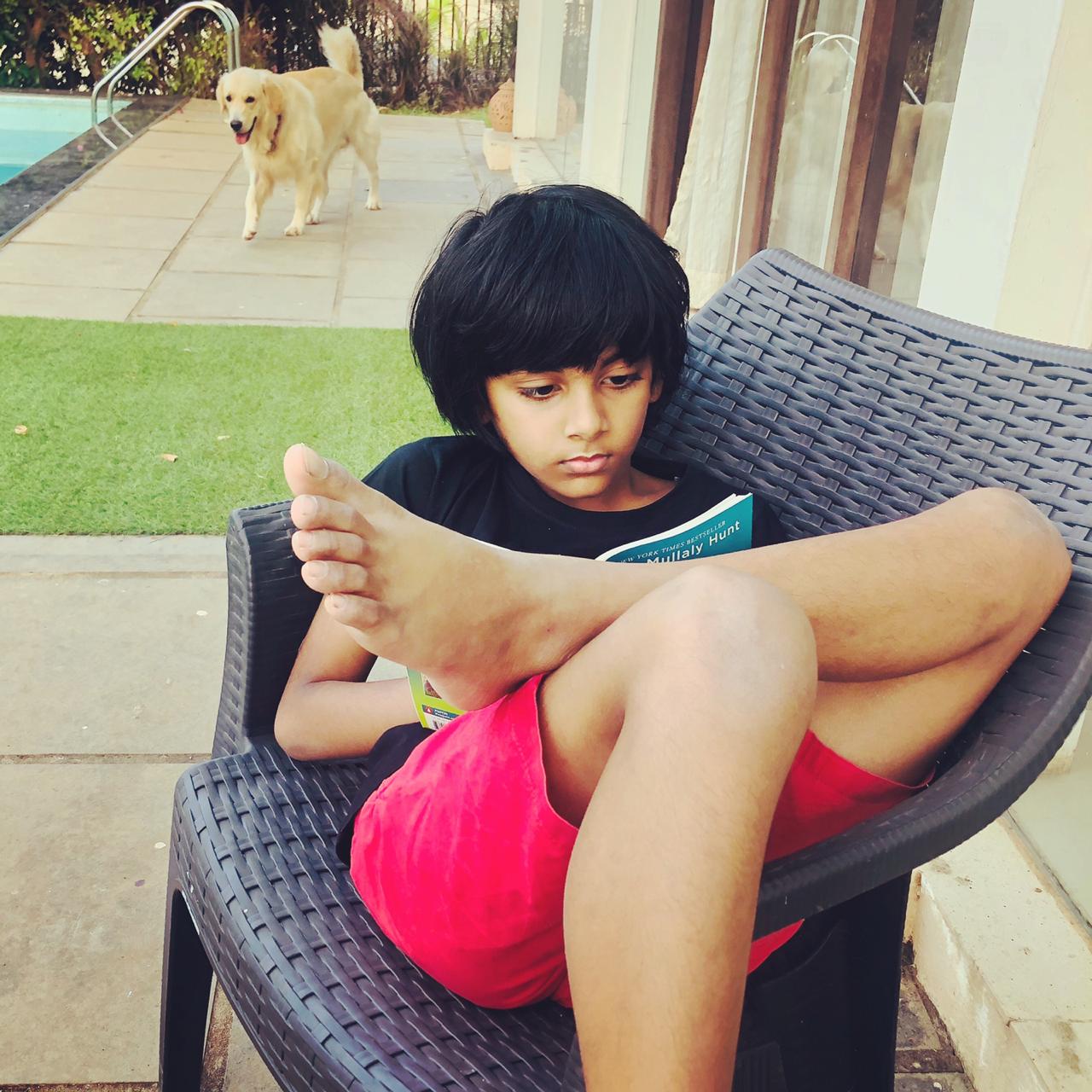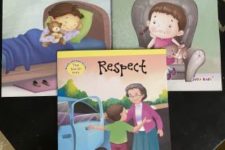As young mothers and fathers, all of us want to bring the world to our children. They are smart, we want them to become smarter, we want to tackle every obstacle that comes their way and we want them to get the best they can. There can be no better way to do this other than through reading and traveling. Both these activities open minds, pique curiosities, help discover, and build imagination and character.

So, where is the challenge? Here’s what I will say, I have often heard parents and caregivers lament about the lack of the right community, a peer group that encourages and explores, they often complain that all the children they know are reading the same books, and well while there is nothing wrong with it per se, I think we do need to think what kind of readers and thinkers and doers would we like our children to become.
My son started recognising alphabets when he was still not 2 years old, and became an early reader at 2.5 years of age. Now he is 8.5 years old and he reads upwards of 100 books a year (including re-reading many of his favourites) with a wide variety of genres – historical fiction, children’s literature, factual accounts, science, astronomy, graphic novels, choose your adventure books, comics and mystery and humour. He is an exceptionally fast reader which I think is to do with his being able to browse through and comprehend different genres.

He was lucky to start with a school that was obsessed about developing reading as a habit (I should clarify they did not expect children to read sentences until they were about 7, but they expected teachers and parents to read to their kids every single day, to inculcate the love for reading). I think as parents we did fine on that front. This might sound hilarious, but I would read aloud newspaper articles to him when he was rocking in his chair as 6 months old. The past few years I have worked on our reading consciously – I have built on my reading diversity and am seeing the benefits of it, so I have tried something similar for my son.
Each child is different and may have their own way of engaging with books and literature, so I don’t think we need to be judgmental. Just the act of being able to pick up any /many book(s) and get engrossed in the stories allows their imagination to flourish and that itself is a thing to celebrate.
Do not get bogged down by the lack of a peer group, access to libraries, budget constraints, lack of variety. I personally think that what we highlight as a problem, is usually laziness (excuse me for saying this!) on the part of parents and the children. There is comfort in conformity, there is risk in the unknown. Plus, who has the time, and how do you know that the choices you made were the right ones.
Well, our choice of literature is a little like fast fashion, or fast food, I think. Nothing wrong in that, but nothing to enrich the body and soul either. So, what should we do? I am going to share my ten-point list that has been helpful for me to overcome some of the common challenges that all of us face as parents to young kids. I have been able to use various tips and tricks to add diversity to my child’s reading, provide access to a diverse peer group, encourage imagination and inculcate the love for reading.

- Usual is Not Always Boring: So your child is refusing to read Enid Blyton or Grimms, and only wants to read Wimpy Kid, Geronimo Stilton, and Tom Gates. Let them, I say! Put yourself in their shoes, what if your family had not let you read Enid Blyton but had insisted you only read Tagore and Amar Chitra Katha? If they want to willingly pick up a book and explore and if they want to feel a sense of belonging with their friends who are all reading them, it is alright. All is not lost. Let them go at their own pace to grow out of some of the usual books, open up avenues and let them choose, but don’t push them in a single track just because you think it is the best one.
- Widen the horizon: I create multiple reading channels and avenues for my son. I feel this is important so that they have variety, they have access to genres and stories from different cultures. In addition to his school library, our home library is decently stocked, and we keep adding periodically to it. He gets access to my kindle and I have also subscribed to kindle unlimited for him and myself (it is 199 per month and you can borrow up to 10 books simultaneously, the selection isn’t the greatest but there is ample variety). We explore audio story podcasts (these are all free), a reading app called epic! (slightly expensive at about $8 per month, but worth it for advanced readers. If you can convince your school to subscribe it is free for schools and free for children). I have found a new story writing online community where kids write, rate and review.
- Make Things Up: Our school librarian is very smart. She has them write reviews and pins them to the bulletin board, she creates a leaderboard sometimes, she does activities like Book Bingos and Monthly challenges. She guides but lets them explore. This makes reading fun at school, and we try some of these things at home too during vacations and weekends.
- Simplify and Translate: Now there are books that are archaic, old world, or classics. Sometimes they are folk tales in a language I read but he doesn’t. We pick these for bedtime reading. WE have read books like Adventures of Tom Sawyer, Treasure Island, Mahabharata and Ramayana like that, many others too. Often it is English that needs to be translated into English that he can understand, sometimes it is the culture and gender roles that he needs to get a grasp on. We don’t leave it open to interpretation. We discuss and we voice what is uncomfortable.
- Mix it Up: Just because she/he is a child doesn’t mean they have to only read children’s books. If you think it is a book they can comprehend or it would build their curiosity, pass it on. I often pass on the books I read, to my son, if I feel the content is something he might enjoy. For example, last year I read What to Do When I’m Gone and Maus – these are books for grown-ups, but he read them, and it helped him explore emotions like grief, loss and optimism. Several other books like The Drawing Lesson, Totto Chan, Wonder, Fish in a Tree, he loved. We keep passing books by Neil Gaiman back and forth. He loves these and has reread most of them several times.
- Don’t just Read, Listen and Touch too: We are keeping up with the times, we don’t just read, we hear as well. We discovered audio podcasts for stories, poems and songs a few years ago and use it quite regularly. It’s great to hear when on long drives, or at bedtime on days when we are too tired to read or traveling. The best past about audio podcasts is that there is a huge variety, available for free and gives my child access to a very wide variety of genres and folktales from other countries. Touch is something we are doing less off now, but we used to get a lot of interactive books and learning kits earlier. Many kids find reading tedious, I recommend audio books for them.
- Books to Box Office: We complement books with movies, tv shows sometimes and vice versa. This creates a lot of interest. For example, The Boy who Harnessed the Wind was a movie he watched with his cousin on netflix, and we followed that up with a book. There is the good old Harry Potter series, movies like A Dog’s Purpose, and shows and books like Anne of the Green Gable. Go scan Netflix for movies based on books and discover a whole new world.
- Go Beyond the Stories: I make an active effort to go beyond stories, so poems, songs, riddles, quotes and activity books are part of our annual reading spree. For a child, this variety I believe, is very important to explore. It opens their minds to expressing their own thoughts not just in prose but in illustrations, in poetry, in posters and in gestures.
- Connect the Dots: I encourage complementing activities with books and reading that go into technique/history. For example, sometime last year my son got interested in paper plane making. So, we got him books that told him about history, techniques, and more trivia on paper plane making. When he was 5 years old, I remember he had read the story of Hellen Keller, got interested in braille and was curious to know more. I ordered a couple of braille books for the sighted on amazon and it took him just a week to start reading basic braille alphabets and numbers. He forgot it subsequently, but that is fine.
- Go beyond the reading and listening: Make activities, take them to activities. Author talks, book reviews, illustrating books, group readings, book clubs, acting them out, rewriting stories, recreating different versions of old fables, the list is endless on what you can do. We use story cards (you can get them for 200 rupees at a stationary/ toy shop), my son’s teacher asks them to rewrite their own versions of popular stories and fables, we encourage drawing stories and we go to book fests and exhibitions. It makes the journey fun, the exploration exciting and the memories unforgettable.

I am going to add that as parents and caregivers, it is our job to create opportunities, avenues that our children can explore. Let them find their way through it. Some of us may have the time, resources and interest to actively build reading lists and buy books, but others may not have that. Suspend your judgement and think of it as you would about travel. Take them on the journey, but do not try to recreate the scenery and the destination.
Let this be their discovery!
[Note from Team Kids Book Café: For your convenience, affiliate links (MARKED IN PINK) to some of the books have been added to enable you to buy the books from AMAZON, should you wish to! A very small amount of money comes to kidsbookcafe.com when you purchase a book/anything else via the amazon affiliate link provided (at no extra cost to you!). Do let us know if you need information about other children’s books by writing to asha@kidsbookcafe.com.]





